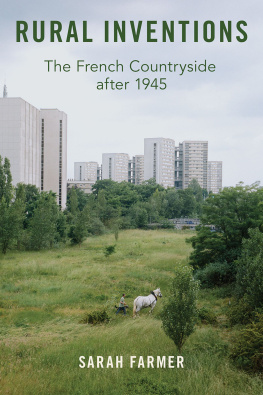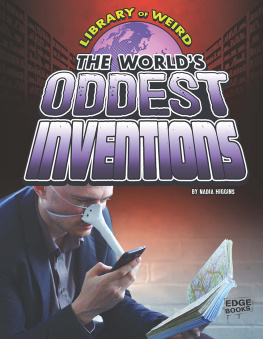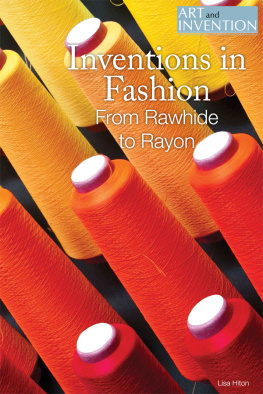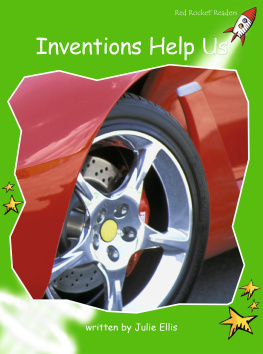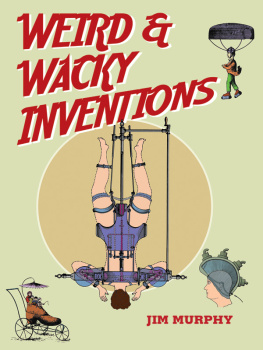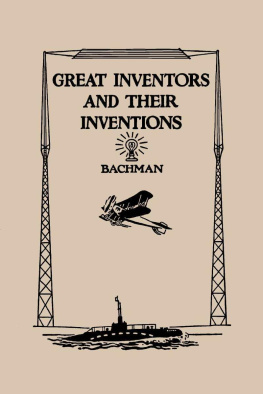Farmer Sarah - Rural Inventions
Here you can read online Farmer Sarah - Rural Inventions full text of the book (entire story) in english for free. Download pdf and epub, get meaning, cover and reviews about this ebook. year: 2020, publisher: OxfordUP, genre: Romance novel. Description of the work, (preface) as well as reviews are available. Best literature library LitArk.com created for fans of good reading and offers a wide selection of genres:
Romance novel
Science fiction
Adventure
Detective
Science
History
Home and family
Prose
Art
Politics
Computer
Non-fiction
Religion
Business
Children
Humor
Choose a favorite category and find really read worthwhile books. Enjoy immersion in the world of imagination, feel the emotions of the characters or learn something new for yourself, make an fascinating discovery.
- Book:Rural Inventions
- Author:
- Publisher:OxfordUP
- Genre:
- Year:2020
- Rating:5 / 5
- Favourites:Add to favourites
- Your mark:
- 100
- 1
- 2
- 3
- 4
- 5
Rural Inventions: summary, description and annotation
We offer to read an annotation, description, summary or preface (depends on what the author of the book "Rural Inventions" wrote himself). If you haven't found the necessary information about the book — write in the comments, we will try to find it.
Rural Inventions — read online for free the complete book (whole text) full work
Below is the text of the book, divided by pages. System saving the place of the last page read, allows you to conveniently read the book "Rural Inventions" online for free, without having to search again every time where you left off. Put a bookmark, and you can go to the page where you finished reading at any time.
Font size:
Interval:
Bookmark:


Oxford University Press is a department of the University of Oxford. It furthers the Universitys objective of excellence in research, scholarship, and education by publishing worldwide. Oxford is a registered trade mark of Oxford University Press in the UK and certain other countries.
Published in the United States of America by Oxford University Press
198 Madison Avenue, New York, NY 10016, United States of America.
Oxford University Press 2020
All rights reserved. No part of this publication may be reproduced, stored in a retrieval system, or transmitted, in any form or by any means, without the prior permission in writing of Oxford University Press, or as expressly permitted by law, by license, or under terms agreed with the appropriate reproduction rights organization. Inquiries concerning reproduction outside the scope of the above should be sent to the Rights Department, Oxford University Press, at the address above.
You must not circulate this work in any other form and you must impose this same condition on any acquirer.
Library of Congress Cataloging-in-Publication Data
Names: Farmer, Sarah Bennett, author.
Title: Rural inventions : the French countryside after 1945 /
Sarah Farmer.
Description: New York, NY : Oxford University Press, [2020] |
Includes bibliographical references and index.
Identifiers: LCCN 2019036720 (print) | LCCN 2019036721 (ebook) |
ISBN 9780190079079 (hardback) | ISBN 9780190079086 (updf) |
ISBN 9780190079093 (epub) | ISBN 9780190079109 (on-line file)
Subjects: LCSH: FranceRural conditionsHistory. | France
History1945 | Sociology, RuralFranceHistory.
Classification: LCC HN425.5 .F3715 2020 (print) | LCC HN425.5 (ebook) |
DDC 306.0944dc23
LC record available at https://lccn.loc.gov/2019036720
LC ebook record available at https://lccn.loc.gov/2019036721
It gives me great pleasure to thank the people and institutions whose advice, knowledge, expertise, suggestions, friendship, and support I relied on over the years as I worked on this book.
The initial research and writing were funded by the National Humanities Center in Triangle Park, North Carolina, which granted me a residential fellowship in 20082009. The support of the director and staff of the center and the intellectual companionship of the other fellows made it a magical year. The School of Humanities at the University of California, Irvine regularly funded research trips to France and provided a subsidy for publication and permission fees for the images reproduced in this book.
My research was facilitated and enriched by the assistance of archivists and librarians in Paris, at public institutions and private organizations. I did much of the work at the Bibliothque nationale de France (BnF) and at the Inathque, housed within the BnF, where the public can consult the national archives of French television and radio. At the Inathque I profited enormously from the expertise of its director, Christine Barbier-Bouvet. Her enthusiasm for my subject and knowledge of the history of French television and radio shaped this project in its early stages. At the section of the Arts du spectacle of the Bibliothque nationale de France, Nolle Giret gave me unhampered access to the archives and papers of Georges Rouquier before they had been formally catalogued. Brigitte Berg welcomed me at Les Documents cinmatographiques, the independent film archives that she directs. At the Dpartement des Estampes et de la photographie, conservator Hlose Consa fostered my access to the collection of original prints of the Mission photographique de la DATAR. The staff of the Association des Gtes de France allowed me to consult the organizations administrative archives and librarians at the Association Maisons paysannes de France guided me to pertinent materials. At the Bibliothque Forney, Marie-Catherine Grichois and Thierry Devynck provided images from the Forneys rich collection of agricultural posters. Thanks to historian Karine-Larissa Basset for the suggestion that I explore the collection of the archives and documentation center of the Parc national des Cvennes in Gnolhac (Gard).
Members and former members of the European cooperative Longo ma made themselves available for extensive interviews in France, Switzerland, and Austria. Particularly helpful were Ulrike Furet, Guido Gorret, Jakob Mytteis, Hannes Reiser, Michael Rssler, and Michael Genner. Antoine Blanchemain, Genevive Savigny, and Patrice and Elisabeth Meynet invited me into their homes for informative discussions of no-ruralit and the politics of agriculture. Raymond Depardon generously gave time to discuss his photographs of his familys farm. He and Nama Kaddour made sure I got the images I needed from Magnum Photos.
I am particularly grateful to scholars and friends who encouraged my desire to venture into new subjects and fields of study. Over many years Vanessa Schwartz has shared her passion for visual history and a willingness to discuss all aspects of my work. Both she and Lynn Hunt urged me to make photography one of the focal points in this study. In Paris, historian of photography Raphale Bertho generously shared her own work, suggested sources, and provided introductions. French historians of rural history and sociology invited me into their longstanding seminar associated with the cole des Hautes tudes in Sciences Sociales: Pierre Alphandry, Franoise Dubost, Martin de la Soudire.
The annual conferences of scholarly organizations provided the opportunity to try out ideas in their early stages: the Society for French Historical Studies, the Western Society for French History, the Society for Architectural Historians. Participation at specialized conferences helped me choose the themes and the structure of my book. Thanks to historians Charles-Franois Mathis and Jean-Franois Mouhot for organizing Une protection de lenvironnement la franaise? held at the University Paris-Sorbonne in 2010. I am grateful to Marc Redepenning, Julia Rssel, and Christoph Baumann for putting together an interdisciplinary conference, Rurality: New Perspectives and Themes, at the University of Bamberg in 2013. In California, colleagues J. P. Daughton at Stanford University and Frank Biess at the University of California, San Diego invited me to present my research at their respective universities.
Every writer needs astute readers to improve their work. I am grateful to the anonymous manuscript reviewers of the journals French History and French Politics, Culture & Society, and to the journals for permission to use material that appeared in the published articles. Lynn Hunt, Jayne Lewis, and Ruth Kluger read drafts of individual chapters. A group of devoted colleagues and friends read the entire manuscript and provided the extensive comments, questions, and constructive criticism that make writing a good book possible: Robert Moeller, Timothy Tackett, Vanessa Schwartz, Mary Woolsey. When it came to publication, I was particularly fortunate that Susan Ferber at Oxford University Press took an early and sustained interest in this project. The anonymous reviewers of the manuscript for OUP gave pertinent, expert advice and Susan provided meticulous, hands-on editing that is rare to find.
Intellectual labor is sustained over the long haul by the exchange of ideas and mutual encouragement shared among colleagues and friends. Of the many people who helped me see this project through I would like to offer thanks to Elizabeth Allen, Michael Bess, Venus Bivar, Adriana Briscoe, Andr Burguire, Ian Coller, Helen Chenut, Denis Charbit, Edward Dimendberg, JoAnne Golden, Arno Gisinger, Jutta Heckhausen, Kevin Olson, Ulrike Luderer, Anne Flipo, Anne Olivier, Laurent Olivier, Anne-Sophie Perriaux, Molly Schneider, Beate Thewalt, and Judy Zevin. My twin sister Elspeth, my brother Daniel, and my parents gave constant support. My mother, Elizabeth Midgley, generously contributed the benefit of her precise thinking and clarity of expression. My father, Thomas Farmer, shared with me his love of history and his conviction of its importance for understanding the world. He would be so pleased to see this book completed.
Font size:
Interval:
Bookmark:
Similar books «Rural Inventions»
Look at similar books to Rural Inventions. We have selected literature similar in name and meaning in the hope of providing readers with more options to find new, interesting, not yet read works.
Discussion, reviews of the book Rural Inventions and just readers' own opinions. Leave your comments, write what you think about the work, its meaning or the main characters. Specify what exactly you liked and what you didn't like, and why you think so.

